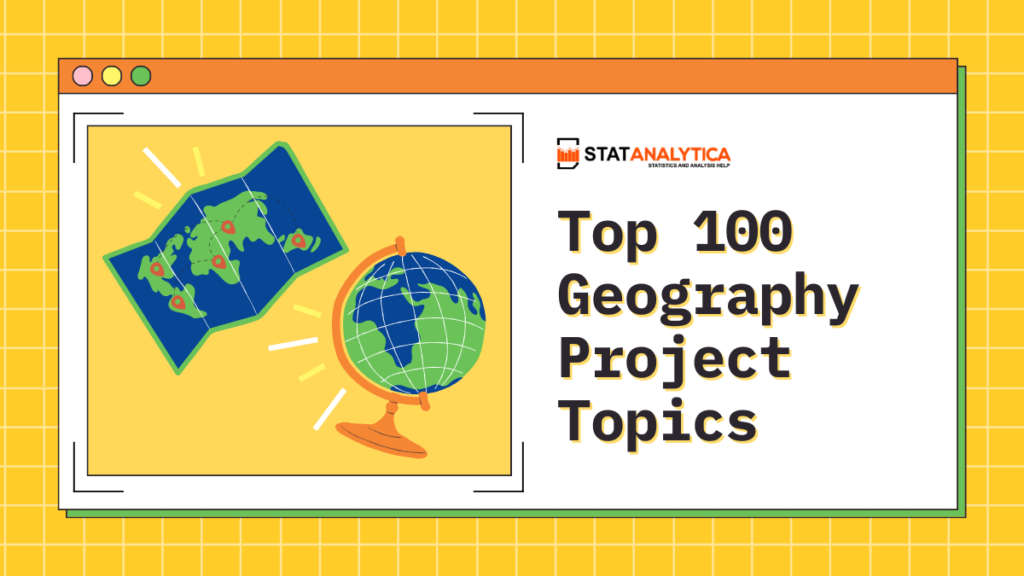Geography is more than just maps and place names; it’s a dynamic field that studies the Earth’s features, inhabitants, and processes. Geography projects offer an exciting opportunity to delve into various aspects of our world, from physical landscapes to human societies. In this blog, we’ll explore a range of engaging top 100 geography project topics suitable for students and enthusiasts alike.

Benefits of Exploring Geography Project Topics
Table of Contents
Exploring geography project topics offers numerous benefits, including:
- Interdisciplinary Learning: Geography projects often integrate elements from various disciplines such as environmental science, sociology, economics, and technology, fostering a holistic understanding of complex issues.
- Critical Thinking: Engaging with geography topics encourages critical thinking skills as students analyze data, evaluate evidence, and propose solutions to real-world problems.
- Global Awareness: Examining various regions and cultures enables students to develop a more expansive worldview, nurturing empathy and comprehension of a wide range of societies and environments.
- Hands-On Experience: Many geography projects involve fieldwork, mapping, and data collection, providing students with practical experience and skills applicable in both academic and professional settings.
- Environmental Stewardship: Investigating topics like climate change, natural disasters, and sustainable development instills a sense of responsibility towards the environment and encourages environmentally conscious behavior.
- Cultural Appreciation: Exploring cultural geography topics allows students to appreciate the diversity of human cultures, traditions, and practices, promoting respect and tolerance for cultural differences.
- Career Opportunities: Geography projects develop skills highly valued in various fields such as urban planning, GIS analysis, international relations, and sustainable development, opening up diverse career paths for students.
- Personal Growth: Through independent research, problem-solving, and project management, students develop confidence, resilience, and a sense of achievement, contributing to their personal growth and academic success.
Overall, exploring geography project topics not only enhances academic learning but also cultivates skills, knowledge, and attitudes essential for informed citizenship and global engagement.
Top 100 Geography Project Topics: Category Wise
Physical Geography Project Topics
- Climate Change and Its Impact on Polar Regions
- Analysis of Tropical Rainforest Biomes
- Coastal Erosion and Management Strategies
- The Formation and Impact of Volcanoes
- Desertification: Causes, Effects, and Solutions
- Glacial Retreat and Its Consequences
- Hydrological Cycle and Water Management
- Plate Tectonics and Earthquake Prediction
- Weather Patterns and Climate Variability
- Soil Erosion and Conservation Techniques
Human Geography Project Topics
- Urbanization Trends and Challenges in Developing Countries
- Migration Patterns in Europe: Causes and Impacts
- Cultural Diversity in Urban Settings
- Economic Disparities between Rural and Urban Areas
- Gender Inequality in Access to Resources
- Tourism Development and Its Effects on Local Communities
- Globalization and Its Impact on Indigenous Cultures
- Population Growth and Urban Sprawl
- Political Geography of Border Conflicts
- Sustainable Development Goals and Progress
Geospatial Technology Project Topics
- Geographic Information Systems (GIS) Applications in Environmental Monitoring
- Remote Sensing Techniques for Land Use Mapping
- GPS Technology in Wildlife Tracking and Conservation
- LiDAR Technology for Terrain Mapping
- Spatial Analysis of Crime Patterns
- Mobile Mapping Applications for Disaster Response
- Drone Technology in Geographic Research
- Big Data Analytics for Urban Planning
- Crowdsourced Mapping for Disaster Risk Reduction
- Web Mapping Applications for Public Participation
Regional Geography Project Topics
- Case Study of the Amazon Rainforest: Biodiversity and Conservation
- Comparative Analysis of East Asian Megacities
- Geography of Conflict: The Middle East
- Economic Development in Sub-Saharan Africa
- Environmental Challenges in the Himalayan Region
- Cultural Landscapes of Europe: UNESCO World Heritage Sites
- Political Geography of South America: Border Disputes
- Oceania: Islands, Culture, and Climate Change
- Arctic Region: Resources and Governance
- Caribbean Islands: Tourism and Sustainability
Interdisciplinary Geography Project Topics
- Climate Change Adaptation Strategies in Coastal Communities
- Public Health and Environmental Pollution
- Urban Agriculture and Food Security
- Renewable Energy Potential and Implementation
- Disaster Risk Reduction and Resilience Building
- Indigenous Knowledge and Environmental Management
- Smart Cities: Technology and Sustainability
- Environmental Justice and Equity
- Gender Perspectives in Disaster Management
- Climate Refugees: Challenges and Solutions
Geography Education Project Topics
- The Use of Geospatial Technologies in K-12 Education
- Inquiry-Based Learning in Geography Classrooms
- Fieldwork Techniques for Geography Students
- Integrating Geography into STEM Education
- Geography Awareness Week: Activities and Resources
- Virtual Field Trips for Geography Education
- Story Maps as Educational Tools
- Gamification in Geography Learning
- Outdoor Education and Experiential Learning
- Citizen Science Projects in Geography Education
Environmental Geography Project Topics
- Air Pollution Monitoring and Mitigation Strategies
- Water Scarcity and Water Management Policies
- Waste Management and Recycling Initiatives
- Urban Heat Island Effect and Green Infrastructure
- Deforestation and Reforestation Efforts
- Marine Pollution and Ocean Conservation
- Sustainable Agriculture Practices
- Energy Transition and Renewable Resources
- Biodiversity Conservation in Urban Areas
- Green Building Design and Sustainable Architecture
Social Geography Project Topics
- Gentrification and Neighborhood Change
- Spatial Patterns of Poverty and Social Exclusion
- Health Inequalities and Access to Healthcare
- Gendered Spaces: Women’s Safety and Mobility
- Ethnic Enclaves and Cultural Identity
- Urban Segregation and Housing Policy
- Rural-Urban Migration and Social Integration
- LGBTQ+ Geographies: Space, Place, and Identity
- Ageing Population and Urban Design
- Disability and Accessibility in the Built Environment
Economic Geography Project Topics
- Global Trade Networks and Supply Chains
- Foreign Direct Investment and Economic Growth
- Industrial Clusters and Innovation Hubs
- Informal Economy and Urban Informality
- Tourism and Economic Development
- Agricultural Land Use and Food Systems
- Economic Geography of Natural Resource Extraction
- Economic Resilience and Regional Development
- Global Financial Centers
and Urban Economies - Economic Geography of Post-Industrial Cities
Political Geography Project Topics
- Geopolitics of Energy Resources
- Territorial Disputes in the South China Sea
- Border Walls and Border Security Policies
- Secessionist Movements and Self-Determination
- Refugee Camps and Forced Migration
- Electoral Geography and Gerrymandering
- Colonial Legacies and Post-Colonial Geopolitics
- Geopolitical Implications of Climate Change
- Geopolitics of Cyberspace and Digital Surveillance
- Nationalism and Identity Politics in a Globalized World
Things To Avoid Mistakes In Geography Projects
Avoiding mistakes in geography projects is crucial for ensuring accuracy, reliability, and effectiveness. Here are some common pitfalls to avoid:
- Lack of Clear Research Objectives: Ensure that your project has well-defined research objectives and a clear focus. Unclear goals can lead to confusion and haphazard research.
- Insufficient Background Research: Conduct thorough background research on your topic before diving into the project. Lack of understanding can result in inaccurate interpretations and conclusions.
- Ignoring Methodological Rigor: Follow proper research methods and techniques appropriate for your study. Neglecting methodological rigor can undermine the credibility of your findings.
- Poor Data Quality: Use reliable and up-to-date data sources for your project. Relying on outdated or inaccurate data can lead to flawed analysis and conclusions.
- Misinterpretation of Data: Take care to analyze and interpret your data accurately. Misinterpreting data can lead to erroneous conclusions and undermine the validity of your project.
- Overgeneralization: Avoid making sweeping generalizations based on limited data or observations. Acknowledge the limitations of your study and avoid extrapolating findings beyond their scope.
- Neglecting Spatial Context: Geography projects often involve spatial analysis, so consider the spatial context of your research. Failure to account for spatial relationships can lead to incomplete or misleading conclusions.
- Ignoring Ethical Considerations: Be mindful of ethical considerations in your research, particularly when working with human subjects or sensitive data. Respect confidentiality, privacy, and consent guidelines.
- Inadequate Citation and Attribution: Properly cite and attribute sources for all data, information, and ideas used in your project. Failure to do so can result in accusations of plagiarism and academic misconduct.
- Poor Communication: Clearly communicate your findings, methodology, and conclusions in your project report or presentation. Use appropriate language and visuals to effectively convey your message to your audience.
- Failure to Seek Feedback: Seek feedback from peers, mentors, or advisors throughout the project to identify and address potential issues early on. External perspectives can help improve the quality of your work.
- Procrastination: Avoid procrastination and manage your time effectively throughout the project timeline. Starting early and maintaining a consistent workflow can prevent rushed or incomplete work.
By avoiding these common mistakes and following best practices in geography research, you can ensure the quality and success of your projects.
Conclusion
Geography offers a vast array of intriguing topics for exploration, ranging from physical landscapes to human societies and from traditional fieldwork to cutting-edge technology.
Whether you’re interested in understanding the forces shaping our planet or addressing pressing societal challenges, there are various geography project topics waiting for you to discover and delve into further.
So, grab your maps, data, and curiosity, and embark on a fascinating journey through the diverse and dynamic world of geography. Happy exploring!
Struggling with assignments? Don’t worry—Statanalytica has got your back! Our expert writers deliver high-quality, well-researched assignments in all subjects and topics to help you excel. Plus, to make things even better, we’re offering up to 30% off on your first order! Don’t miss out on this student-friendly deal—Order Now & Save Big!


